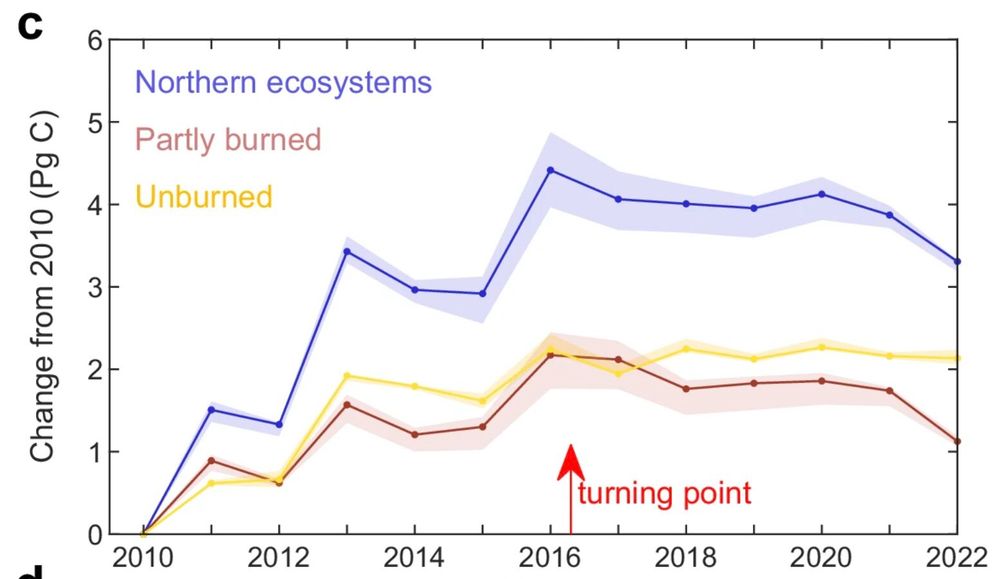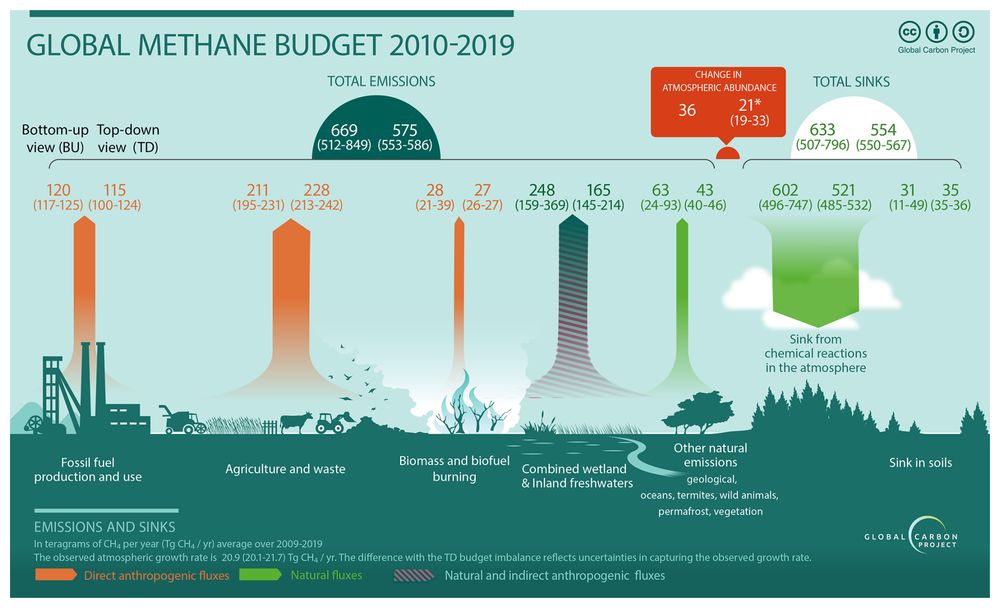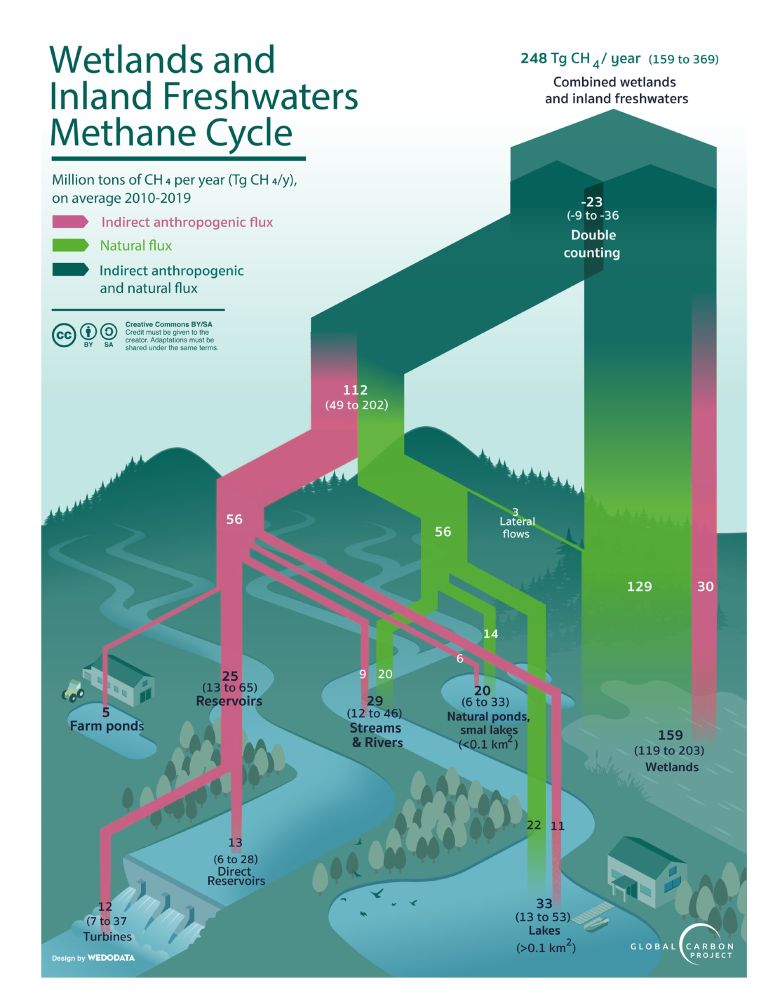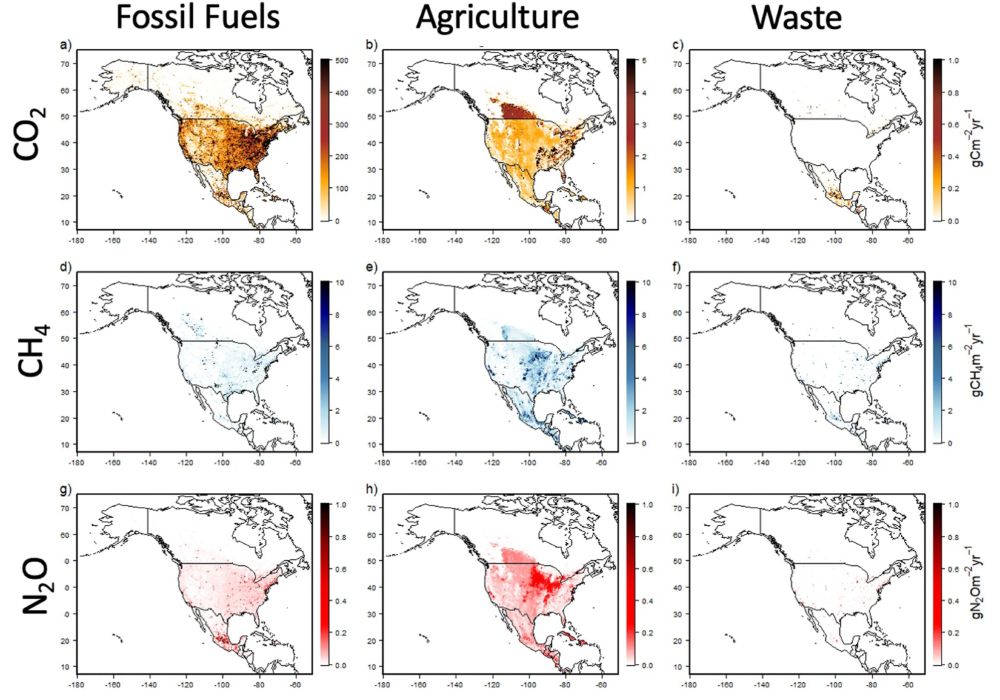And a second paper describing all the research advances the group and the broader community have achieved, leading to this year's much-improved and constrained Global Carbon Budget.
essd.copernicus.org/preprints/es...
www.nature.com/articles/s41...

And a second paper describing all the research advances the group and the broader community have achieved, leading to this year's much-improved and constrained Global Carbon Budget.
essd.copernicus.org/preprints/es...
www.nature.com/articles/s41...
To support this year's Global Carbon Budget, 2025, we are publishing
The big paper, made possible by the strong commitment of a core group of scientists, with @pfriedling.bsky.social at the lead, working with a network of equally committed contributors from 102 research organizations worldwide

To support this year's Global Carbon Budget, 2025, we are publishing
The big paper, made possible by the strong commitment of a core group of scientists, with @pfriedling.bsky.social at the lead, working with a network of equally committed contributors from 102 research organizations worldwide
If you are interested in diving deeper into the data, global and national trends, summary PPT, and a myriad of figures, visit the Global Carbon Budget page:
www.globalcarbonproject.org

If you are interested in diving deeper into the data, global and national trends, summary PPT, and a myriad of figures, visit the Global Carbon Budget page:
www.globalcarbonproject.org
We just published the Global Carbon Budget 2025, with a mix of bad news (CO2 emissions continue to grow) and encouraging news (35 countries saw emissions decline over the past decade while growing their economies).
Read the highlights in a short article:
theconversation.com/the-worlds-c...

We just published the Global Carbon Budget 2025, with a mix of bad news (CO2 emissions continue to grow) and encouraging news (35 countries saw emissions decline over the past decade while growing their economies).
Read the highlights in a short article:
theconversation.com/the-worlds-c...
agupubs.onlinelibrary.wiley.com/doi/10.1029/...

agupubs.onlinelibrary.wiley.com/doi/10.1029/...
I feel privileged to have had the opportunity to make a small contribution to this paper, just published.
"Building relationships between First Nations Peoples and Western scientists to increase capacity to understand, respond and adapt to climate change"

I feel privileged to have had the opportunity to make a small contribution to this paper, just published.
"Building relationships between First Nations Peoples and Western scientists to increase capacity to understand, respond and adapt to climate change"
A new study, led by Matthias Cuntz and our dearest late Vanessa Haverd, shows beautifully how the increase of the seasonal variation in atmospheric CO2 in the Northern Hemisphere over the past 40 years can only be explained by an increase in the CO2 uptake by plants.
doi.org/10.1029/2025...

A new study, led by Matthias Cuntz and our dearest late Vanessa Haverd, shows beautifully how the increase of the seasonal variation in atmospheric CO2 in the Northern Hemisphere over the past 40 years can only be explained by an increase in the CO2 uptake by plants.
doi.org/10.1029/2025...
"Large live biomass carbon losses from droughts in the northern temperate ecosystems during 2016-2022". Nature Communications
www.nature.com/articles/s41...

"Large live biomass carbon losses from droughts in the northern temperate ecosystems during 2016-2022". Nature Communications
www.nature.com/articles/s41...
There is so much discussion about TIPPING POINTS, yet there are so few current large-scale examples that have been demonstrated quantitatively.
Xiaojun Li et al show a remarkable shift from accumulating carbon in living biomass in the northern temperate regions to losing carbon since 2016.

There is so much discussion about TIPPING POINTS, yet there are so few current large-scale examples that have been demonstrated quantitatively.
Xiaojun Li et al show a remarkable shift from accumulating carbon in living biomass in the northern temperate regions to losing carbon since 2016.
If you are looking for a postdoctoral position, here are two great opportunities to work with Julia Pongratz in Germany, great group, great science:
1. Postdoc for ecosystem-climate interactions:
job-portal.lmu.de/jobposting/8...

If you are looking for a postdoctoral position, here are two great opportunities to work with Julia Pongratz in Germany, great group, great science:
1. Postdoc for ecosystem-climate interactions:
job-portal.lmu.de/jobposting/8...
I am delighted to see the first special journal issue dedicated to China's GHG accounting and budgets from an incredibly strong research community there, well-connected, and contributing to the international efforts of the Global Carbon Project.

I am delighted to see the first special journal issue dedicated to China's GHG accounting and budgets from an incredibly strong research community there, well-connected, and contributing to the international efforts of the Global Carbon Project.
Seeking a dynamic data expert to support the coordination and production of the next Global CH4 Budget.
If you are interested, drop an email to marielle.saunois@lsce.ipsl.fr

Seeking a dynamic data expert to support the coordination and production of the next Global CH4 Budget.
If you are interested, drop an email to marielle.saunois@lsce.ipsl.fr
Thanks to the many contributors for making this effort possible under the umbrella of the Global Carbon Project, and importantly, many thanks to Marielle Saunois for her leadership and synthesis effort.
www.globalcarbonproject.org/methanebudge...

Thanks to the many contributors for making this effort possible under the umbrella of the Global Carbon Project, and importantly, many thanks to Marielle Saunois for her leadership and synthesis effort.
www.globalcarbonproject.org/methanebudge...
1. Reduced double-counting of inland waters (rivers, lakes, wetlands, reservoirs...)
2. A first-of-its-kind partition between anthropogenic and natural emissions from inland waters,
3. Increased use of satellite methane data

1. Reduced double-counting of inland waters (rivers, lakes, wetlands, reservoirs...)
2. A first-of-its-kind partition between anthropogenic and natural emissions from inland waters,
3. Increased use of satellite methane data
The new Global Methane Budget is now published, open access.
essd.copernicus.org/articles/17/...

The new Global Methane Budget is now published, open access.
essd.copernicus.org/articles/17/...
3. Emissions from land use change increased by 45%, due to continued land clearing and decreased afforestation as an emission offset.
4. CO2 sinks from terrestrial ecosystems increased due to the CO2 fertilization effect of increasing atmospheric CO2.

3. Emissions from land use change increased by 45%, due to continued land clearing and decreased afforestation as an emission offset.
4. CO2 sinks from terrestrial ecosystems increased due to the CO2 fertilization effect of increasing atmospheric CO2.
A new Greenhouse Gas Budget for South Asia reveals key GHG data and trends for a region with limited publicly available GHG information.
1. Total GHG emissions in South Asia increased by up to 43% during the decade of 2010s compared to the previous one.

A new Greenhouse Gas Budget for South Asia reveals key GHG data and trends for a region with limited publicly available GHG information.
1. Total GHG emissions in South Asia increased by up to 43% during the decade of 2010s compared to the previous one.
Led by Ben Poulter, it reconciles the differences between the National GHG Inventories, atmospheric inversions, and estimates from modeling individual fluxes.
agupubs.onlinelibrary.wiley.com/doi/full/10....

Led by Ben Poulter, it reconciles the differences between the National GHG Inventories, atmospheric inversions, and estimates from modeling individual fluxes.
agupubs.onlinelibrary.wiley.com/doi/full/10....
The REgional Carbon Cycle Assessment and Processes, phase 3 (RECCAP3) to propose a new generation of GHG budgets.
academic.oup.com/nsr/article/...

The REgional Carbon Cycle Assessment and Processes, phase 3 (RECCAP3) to propose a new generation of GHG budgets.
academic.oup.com/nsr/article/...
A new assessment shows a larger C sink from LUC compared to previous estimates.
www.nature.com/articles/s41...

A new assessment shows a larger C sink from LUC compared to previous estimates.
www.nature.com/articles/s41...

